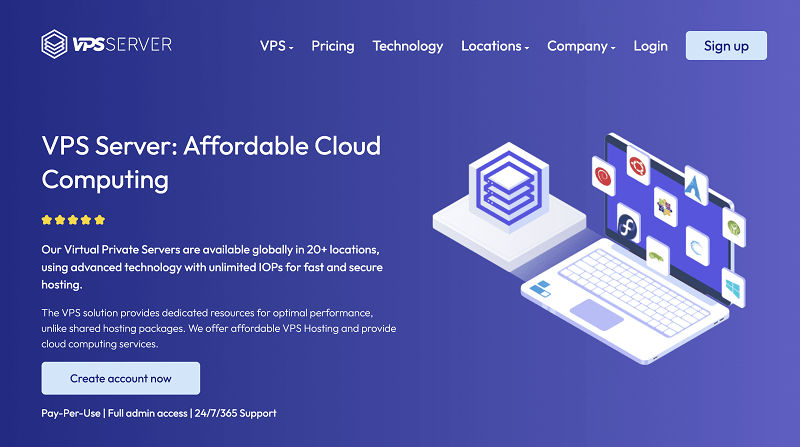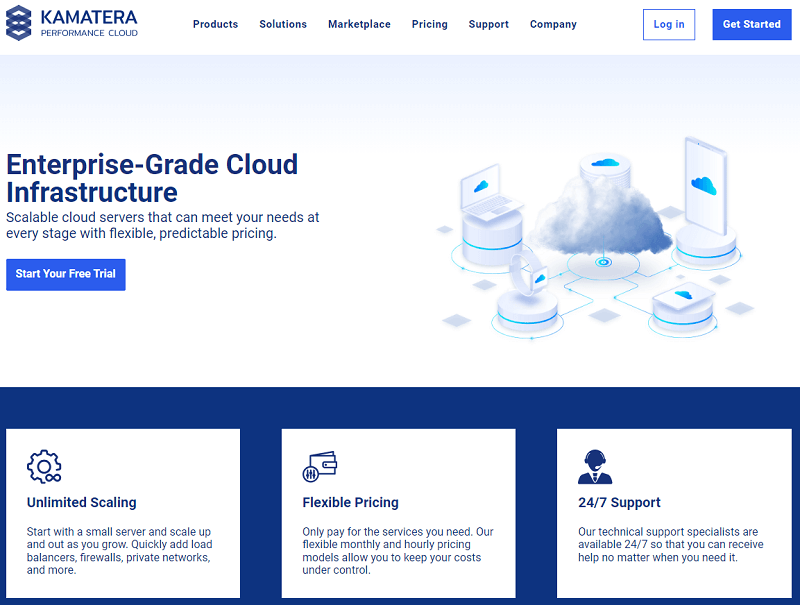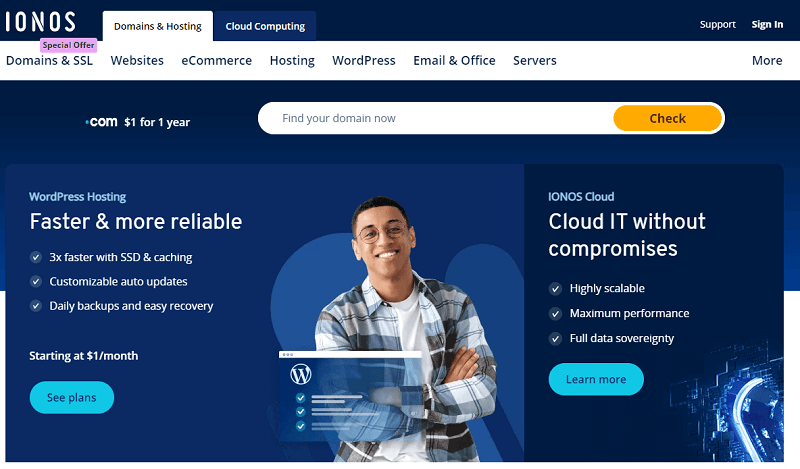Good VPS Hosting

In the fast-evolving digital realm and virtual server, selecting the appropriate hosting solution is critical for the success of any online endeavor. Great Isolated Server Hosting stands as a prominent choice for both businesses and individuals in search of a reliable, scalable, and cost-effective web hosting solution. Virtual Private Server hosting effectively bridges the gap between economical shared hosting and the robustness of dedicated servers, offering users exceptional control, flexibility, and performance. This guide delves deep into the specifics of a Virtual Server, Windows VPS, and cheap Windows VPS Server, accentuating its advantages, identifying top providers for 2024, and providing valuable insights to aid in making informed decisions in this vibrant hosting environment. Whether expanding a startup or enhancing an established web presence, comprehending the intricacies of great VPS hosting is crucial to fully realizing your digital potential.
-
- What is VPS Hosting?
- 11 Best VPS Hosting Providers 2024
- Selecting the Right VPS Hosting Provider
- What Does VPS Hosting Cost?
- Identifying the Time to Switch from Shared to VPS Hosting
- Other Types of Web Hosting Services To Consider
What is VPS Hosting?

Virtual Private Server (VPS) hosting stands as a distinctive and dynamic form of web hosting, positioned between the shared and dedicated hosting paradigms in the spectrum of web hosting solutions. Utilizing advanced virtualization software, Isolated Server hosting effectively segments a single physical server into several isolated virtual servers. Each of these servers operates independently within its dedicated environment, thus ensuring that users enjoy a slice of the server completely cordoned off from others. This innovative approach not only facilitates a marked enhancement in terms of performance and stability—by allocating dedicated resources like CPU, RAM, and disk space exclusively to each Virtual Private Server or Windows VPS Server—but also circumvents the common pitfalls associated with shared hosting, where the collective demand on resources can adversely affect all users housed on the server.
The architecture of Isolated Server hosting or a Windows VPS renders it exceptionally beneficial for businesses and websites positioned at a critical juncture of growth. They find themselves constrained by the limitations inherent in shared hosting environments yet need to be sufficiently resource-intensive to justify the leap to the considerable expenses associated with dedicated servers. This unique hosting model offers an unparalleled equilibrium of cost, flexibility, and control, empowering users with the capability to install custom software and configure their hosting environments to their precise specifications. Such autonomy includes the administration of sophisticated operating systems, the implementation of a customized security framework, and the freedom to run complex databases and applications, all without the need to invest in the exclusive use of a physical server.
Dedicated Hosting or VPS Server excels at adapting to the varying demands of an expanding website or application. In contrast to shared hosting, where a rise in traffic or resource needs for one site can affect all other sites on the server, a Windows VPS setting offers quick scalability. Users can swiftly adjust their resource allocation to handle increases in traffic or expand their online operations, ensuring their digital presence remains strong and reactive at all times. They can also get a cheap Windows VPS Server.
Dedicated Hosting fulfills a broad array of web hosting requirements, from supporting multiple websites to accommodating different operating systems, including options for both Windows VPS Hosting and Linux VPS hosting. It provides a stable base for web applications that demand reliable performance and consistent uptime. Offering features like full root access, Isolated Server hosting allows users to achieve a level of control similar to that of a dedicated server, which facilitates deep customization and fine-tuning of their hosting environment. This is particularly crucial for businesses that require specific server configurations or run custom applications.
Security, a paramount concern for any online endeavor, is significantly bolstered in a VPS Server setup. By virtue of their isolated environments, virtual private servers are insulated from the vulnerabilities that might affect other users on the same physical server. Coupled with dedicated IP addresses and the capacity to implement stringent security protocols and software—without the limitations often encountered in shared hosting scenarios—VPS hosting offers a secure haven for sensitive data and transactions.
VPS Web Hosting provides a versatile, scalable, and secure option for a web host, striking an optimal balance between performance, control, and affordability. Designed to meet the unique requirements of businesses and websites at various growth phases, it offers a strong foundation for thriving in the competitive digital environment. Whether you're starting a new online venture, growing an established business, or boosting the performance of a demanding application, VPS web hosting delivers a persuasive solution that adeptly fills the gap between shared and dedicated web hosting services.
11 Best VPS Hosting Providers 2024
| Rank | Provider | Starting Price | OS Options | Plan Flexibility |
|---|---|---|---|---|
| 1 | VPSServer | 4/month | Windows, Linux | Managed, Unmanaged |
| 2 | Kamatera | Custom | Windows, Linux | Highly Customizable |
| 3 | DreamHost | 10/month | Linux | Managed |
| 4 | SiteGround | 80/month | Linux | Managed |
| 5 | GreenGeeks | 5/month | Linux | Managed, Unmanaged |
| 6 | GoDaddy | 4.99/month | Windows, Linux | Managed, Unmanaged |
| 7 | Ionos | 2/month | Windows, Linux | Managed, Unmanaged |
| 8 | HostPapa | 19.99/month | Linux | Managed |
| 9 | Hostinger | 3.95/month | Windows, Linux | Managed, Unmanaged |
| 10 | A2 Hosting | 5/month | Windows, Linux | Managed, Unmanaged |
| 11 | Hostwinds | 5.24/month | Windows, Linux | Managed, Unmanaged |
Choosing the right Virtual Private Server provider and the best Windows VPS server is essential for reliable and efficient website operation. As of 2024, leading Windows VPS services excel by offering superior service quality, robust infrastructure, and competitive rates. Notably, VPSServer, Bluehost, and SiteGround are praised for their intuitive management interfaces and excellent customer support. A2 Hosting and InMotion Hosting are distinguished by their high performance and scalability, serving both small businesses and large enterprises effectively. These providers present a range of plans, from simple VPS setups for smaller sites to advanced packages with abundant resources and managed services, as well as cheap Windows VPS hosting, enabling businesses to find an appropriate option for their needs.
1. VPSServer

VPSServer leads the pack with its remarkable fusion of affordability, cheap Windows VPS Hosting, and robust functionality, with introductory rates beginning at just 4 each month. The provider offers an extensive selection of VPS hosting setups that support both Windows VPS Hosting and Linux environments, designed to satisfy a broad spectrum of client needs. Its expansive network of worldwide data centers ensures minimal latency and consistent uptime, providing a stable and reliable hosting solution. Clients are offered a choice between managed and unmanaged VPS options, enabling customization to meet specific operational demands. VPSServer's emphasis on superior performance, security, and flexibility secures its position as the foremost choice in our VPS hosting assessments.
2. Kamatera

Kamatera secures the second spot with its tailor-made VPS hosting services, which stand out for their adaptability and scalability. It allows for detailed customization and provides cheap Windows VPS Hosting, also including CPU, RAM, and storage adjustments to suit various business sizes and needs. Kamatera is renowned for its cloud infrastructure's flexibility, offering immediate scalability and resource adjustments with minimal downtime. Their customer-centric approach, featuring robust support and a pay-per-use pricing model, makes Kamatera a preferred choice for businesses seeking a dependable and scalable VPS hosting solution.
3. DreamHost

DreamHost is highly recommended for its easy-to-use custom control panel and responsive customer service via live chat and tickets, although 24/7 phone support is not provided. It features fast SSD storage, free SSL certificates for secure browsing, and SSH access for advanced users. DreamHost offers free hosting for 501(c)(3) nonprofits and maintains transparent pricing for others, with a 97-day money-back guarantee, which is notably generous.
4. SiteGround

SiteGround bridges the gap between consumer and business web hosting, making it perfect for small businesses with complex requirements that may expand over time. Its GoGeek plan offers advanced features like a staging server and Git repository creation. With all plans, SiteGround provides SSL, daily backups, CDN, email, and unlimited databases, but with upfront limits on bandwidth and storage. Their managed cloud hosting offers greater control and faster provisioning, justifying its higher cost. Prepayment is required for the best rates, with prices increasing after the first year.
5. GreenGeeks

Concerns about the high energy consumption of large data centers are addressed by GreenGeeks, which prioritizes environmental sustainability. The company purchases triple the amount of wind energy credits compared to its usage, contributing positively to the green energy sector. Besides its eco-friendly approach, GreenGeeks provides robust web hosting solutions, including a comprehensive shared hosting plan with various features and support, catering to both general users and developers with its array of technical offerings.
6. GoDaddy Web Hosting

GoDaddy, widely recognized for its domain name services, also provides diverse web hosting solutions, including WordPress and e-commerce hosting, excluding cloud hosting. Their basic shared hosting package features unlimited bandwidth, easy WordPress setup, a domain, and first-year Office 365 email. GoDaddy supports its offerings with around-the-clock phone and live chat assistance.
7. Ionos

Ionos primarily serves small to medium-sized businesses, aiding in their online initiation or expansion. It offers a variety of hosting solutions, such as WordPress hosting, email services, and domain management. However, caution is advised with their pricing structure, as initial low rates may increase over time.
8. HostPapa

HostPapa caters to small businesses and offers complimentary domain transfers, various hosting plans, and extras like a website builder and automatic backups. Distinctively, it features an extensive Q&A section on its pages, aiding in plan selection and potentially reducing the need for direct support contact, which could make it an ideal VPS hosting choice for those seeking extensive guidance.
9. Hostinger

Hostinger provides multiple hosting plans across different price levels, primarily featuring basic services that might lack some desired features. It also offers email hosting, a website builder, and a 30-day money-back guarantee for its services.
10. A2 Hosting

The company excels by including SSD storage, site migration, SSL certificates, and CloudFlare CDN in all plans, enhancing connectivity and security. It utilizes Anycast DNS technology to improve site performance. The support team at A2 Hosting is reachable 24/7 via several channels. However, their listed pricing can be somewhat misleading as the most favorable rates are offered only with annual payments, accompanied by a 30-day money-back guarantee.
11. Hostwinds

Hostwinds is tailored for business and reseller hosting, providing both managed and unmanaged VPS options for Windows VPS Hosting and Linux. Its shared hosting service comes equipped with several features, such as SSD storage, no-cost site transfers, unlimited domains, emails, databases, a free SSL certificate, and a Weebly site builder, making it an all-encompassing option for entrepreneurs.
Selecting the Right VPS Hosting Provider

Determining the optimal VPS hosting provider is vital. This critical decision requires you to carefully consider various elements, including your specific hosting needs and budget restrictions, as well as comprehensively evaluate potential providers' technical proficiency, customer support quality, and overall dependability. Through a thorough and focused review process, you can ensure that the VPS hosting service you select effectively meets your business objectives.
Essential VPS Host Features

Choosing the appropriate VPS hosting provider entails assessing multiple crucial aspects. Key features to look at include scalability, allowing for resource flexibility as your business demands change; performance, which guarantees fast load times and stable server functioning; and diverse storage options, including SSDs for enhanced data access speed. Security is equally important, with measures such as firewalls, intrusion detection systems, and SSL certificates critical for data protection and privacy assurance.
Uptime and Downtime Rates

Understanding uptime and downtime rates is essential for managing the reliability and efficiency of any online service. Uptime denotes the proportion of time that a server or service remains operational and accessible, reflecting the reliability and stability of the hosting setup. In contrast, downtime occurs when the service is not available, usually because of maintenance tasks, technical difficulties, or system failures. These metrics are critical for businesses to evaluate as they directly impact customer satisfaction, trust, and overall operational success. Monitoring these rates helps organizations ensure their services meet user expectations and maintain competitive performance standards.
Uptime Guarantees

Uptime is a crucial metric in web hosting, monitoring the consistent operation of your server. Achieving an uptime greater than 99.9% is essential for ensuring your websites remain operational without interruption. This percentage becomes crucial when evaluating providers of VPS hosting, as it directly influences the dependability of their services, including web hosting, Windows VPS hosting, and dedicated servers. Trustworthy VPS hosting companies often extend uptime promises, underpinned by service level agreements, to ensure that your virtual private server is continuously accessible.
Impact of Downtime

When your server stops working and becomes inactive, it can significantly interrupt business activities, harm customer relationships, and cause economic losses. For organizations that depend on a consistent online presence, such as e-commerce stores and online service enterprises, it is crucial to minimize downtime. Windows VPS hosting, often central to vital business operations, requires rigorous monitoring and strategic maintenance to ensure uninterrupted functionality.
Redundancy and Failover Systems

Credible VPS hosting providers incorporate redundancy within their data centers to maintain high availability and reduce downtime. This redundancy strategy includes multiple power supplies, network connections, and physical servers to establish a fail-safe system. By implementing these safeguards, if one component fails, others are ready to seamlessly continue operations, thereby preserving the user experience for VPS clients. This approach is crucial not only for high-traffic websites but also for any business that values stable and dependable virtual server hosting.
Monitoring and Maintenance

a Great Windows VPS or Hosting providers must rigorously monitor and proactively upkeep high uptime rates. They must consistently check server resources, including CPU load, memory allocation, and disk space, to preemptively tackle issues that might cause downtime. For providers of Windows VPS hosting or a Windows server, this task also entails frequent updates to the Windows VPS Operating System and vital software to mitigate security risks.
Technical and Customer Support

When downtime does occur, rapid response times from technical support can make a significant difference. A Windows VPS provider or Windows Server with dedicated technical support can assist with quick diagnostics and troubleshooting, helping to restore services faster. Support for remote desktop access and control panels like Plesk helps users manage their virtual private servers more effectively during downtime incidents.
Choosing the Right Hosting Provider

When selecting a Windows VPS, Windows Server, or Linux VPS hosting provider, assess their track record of uptime and consider independent ratings or customer testimonials about their reliability. Providers that include dedicated resources like dedicated IP addresses and complete root access tend to have greater control over their hosting conditions, which often enhances overall stability and performance.
Choosing a Windows VPS hosting provider should be heavily influenced by their uptime and downtime performance. Top consideration should be given to providers that offer high uptime assurances supported by comprehensive redundancy measures, effective monitoring, and superior customer support, especially if you require a reliable, constant online presence for critical operations. Whether it's budget-friendly Windows VPS hosting or a fully managed VPS service, the ability to provide continuous high availability is essential for assessing a provider’s competence and quality.
Customer Support

Reliable customer support is critical for Windows VPS hosting. Providers ought to offer a variety of support options, including continuous availability through live chat, telephone, and email. The support team should be expert and swift in responding, adept at resolving a broad spectrum of problems, from technical challenges to queries about account settings.
Importance of Comprehensive Customer Support

Strong customer support is a critical component of any VPS hosting service, ensuring that users have timely assistance with any issues, which enhances their overall experience. A VPS hosting provider needs to offer several support channels to meet the diverse requirements and preferences of its clientele. These should include continuous access to support through live chat, telephone, and email, which is vital for businesses operating non-stop or in different time zones.
Range of Support Offered

The capability of the support team to handle a broad spectrum of problems is essential. This spans technical troubleshooting of the Windows VPS or Linux VPS server, covering issues with the operating system, web hosting control panels like Plesk, and virtualization software, as well as answering routine account management questions. Specifically for services like Windows VPS hosting, the support team must also be skilled in the particular needs and troubleshooting of the Windows VPS Hosting and server environments.
Technical Proficiency and Responsiveness

The technical expertise of the support team is vital. They should not only respond quickly but also possess deep knowledge of the Windows VPS or Linux VPS infrastructure, including custom servers, virtual private servers, and cloud hosting environments. Their ability to swiftly diagnose and resolve issues directly impacts the downtime and performance of the hosted services. For managed Windows VPS Hosting, where the provider manages all aspects of the server's operation, the expertise of the support team becomes even more critical.
Tools and Resources for Self-Help

In addition to direct support, the best Windows VPS or Linux VPS hosting providers also equip their users with extensive self-help resources. These resources could encompass an extensive knowledge base, FAQs, and user forums, where VPS users can quickly find solutions to common problems and tips for enhancing their VPS hosting configurations. Having access to such resources can greatly improve a user's capacity to independently manage their Windows VPS, thereby decreasing the necessity to reach out to support for minor issues.
Custom Support for Complex Configurations

For businesses running complex configurations or hosting multiple websites on a single virtual server, personalized support can be invaluable. Providers offering dedicated resources, full root access, and customized Windows VPS or Linux VPS hosting plans often provide a higher level of support to manage these complex environments effectively. This might include dedicated technical support that understands the specific architecture and needs of their customers’ hosting environment.
Customer Support as a Decision Factor

When selecting a Windows VPS or Linux hosting provider, customer support quality should be a key decision factor. Providers that demonstrate a commitment to quality support tend to offer better service reliability and customer satisfaction. Prospective customers should look at reviews and testimonials, focusing on the responsiveness and effectiveness of the support team to gauge what they can expect.
Outstanding customer service distinguishes leading Windows VPS hosting providers from their rivals. Effective support is crucial, whether for a basic Windows VPS Hosting or a high-end private server. For the applications and services hosted to thrive and remain stable, it's critical that the provider can extend immediate, well-informed, and capable support.
Managed vs. Unmanaged VPS Hosting

The selection of managed versus unmanaged VPS hosting generally depends on the user's technical proficiency and the resources at hand. Managed VPS hosting offers extensive server management, maintenance, and support, catering well to individuals who lack technical skills or prefer to focus on business tasks rather than technical oversight. In contrast, unmanaged VPS hosting grants more control over operational aspects. Allows for greater operational control. It is more cost-effective, but it places the responsibility of server maintenance and problem-solving on the users.
Managed VPS Hosting

When professionalism and lack of skills or time are issues, managed VPS hosting is the perfect solution for businesses or individuals. This type of hosting provides a range of management services, including automatic software updates, security patch installation, dedicated technical support, and routine data backups. Specifically, managed Windows VPS hosting enhances the powerful functionality of the Windows VPS operating system and provides specialized support required for managing the sophisticated environments typical of Windows VPS Hosting.
Critical features of managed VPS hosting include:
-
Complete server management: Windows VPS Hosting or Linux VPS Hosting providers oversee all server-related responsibilities, including updates, maintenance, and security enhancements.
-
24/7 customer and technical support: Users enjoy constant access to professional support, which is key to swiftly and efficiently resolving problems and minimizing downtime.
-
Strengthened security: Managed Windows VPS hosting or Linux VPS hosting provides comprehensive security features, including firewalls, intrusion detection systems, and complimentary SSL certificates, to improve data safety.
-
Optimized performance: Continuous monitoring and regular maintenance guarantee that the server performs at its best, which is vital for businesses depending on their online operations.
Unmanaged VPS Hosting

Unmanaged Windows VPS or Linux VPS hosting is attractive to those with greater technical expertise who desire full control over their server environment. It costs less than managed hosting since users aren't paying for management services. This hosting model is ideal for tech-savvy individuals or organizations with IT staff capable of handling server complexities such as setup, administration, and troubleshooting.
Positive aspects of unmanaged VPS hosting:
-
Cost efficiency: Lower costs since the hosting provider does not include server management services.
-
Complete root access: Users gain total control over their virtual server, enabling them to install and configure software according to their requirements.
-
Customization freedom: More flexibility to optimize the server settings for specific applications or performance requirements.
-
Experiential learning: Optimal for individuals aiming to acquire or refine server management expertise.
Weighing Managed Against Unmanaged VPS Hosting

Deciding whether to choose managed or unmanaged Virtualized Server Hosting depends on what you're comfortable with technologically, what meets your needs, and your budget. Managed Windows VPS hosting is great for businesses that want to focus on their main operations and let skilled professionals handle the technical aspects. It’s a carefree solution because your hosting provider will take on everything from server maintenance to security upgrades, ensuring you have less to worry about.
Alternatively, unmanaged virtualized server hosting fits well with those with adequate technical knowledge who seek total control over their hosting environment. This option permits businesses to configure their hosting according to specific requirements and directly manage their server space.
Would a Dedicated Server Suit Your Specific Needs?

Selecting between VPS and private server hosting ultimately comes down to several crucial considerations: your required power, your budget constraints, and the level of control you desire over your server. It’s vital to carefully assess these elements to identify the most suitable hosting option that aligns with your specific needs and objectives. Virtualized Server Hosting offers an economical approach with flexible resource scalability. At the same time, dedicated servers deliver top-tier performance and exclusive resource allocation, which are well-suited for larger enterprises and websites experiencing substantial traffic.
Understanding VPS Hosting

A Virtual Private Server offers a hosting environment that blends cost efficiency with considerable user control, mimicking the functionality of a private server in a shared hosting context. It is particularly suitable for small to medium-sized companies that desire more autonomy than shared hosting offers without the need for the extensive resources of a private server.
Key benefits of VPS hosting include:
-
Cost-Effectiveness: Virtualized Server Hosting is generally more affordable than dedicated hosting because resources are allocated from a shared physical server.
-
Scalability: Virtualized Server Hosting plans often allow you to scale resources according to your requirements, making them perfect for businesses expecting growth and variable traffic levels.
-
Control: Virtualized Server Hosting delivers full root access to your server, much like owning a custom server. This grants you the ability to install any software that the server's operating system can support.
-
Security: Virtualized Server Hosting typically features substantial security enhancements, including dedicated IP addresses and optional managed services, which elevate security levels without necessitating direct management on your part.
Understanding Dedicated Server Hosting

Private server hosting allocates an entire server exclusively to your website or applications, ensuring high performance and extensive resource provision. This makes it ideal for large enterprises and websites with significant traffic volumes.
Benefits of private server hosting include
-
Optimal Performance: Being the sole user, you benefit from the full capacity of the server, which guarantees that your operations proceed seamlessly without interference from other users.
-
Superior Security: Exclusive access to the server allows you to manage security protocols and adhere to compliance standards completely.
-
Personalization: You can tailor hardware and software according to your specific needs, including choices in operating systems and web hosting control panels.
-
High Reliability: Dedicated hosting typically includes strong uptime commitments and comprehensive disaster recovery strategies.
Deciding Factors

Several key factors should guide the choice between VPS and dedicated server hosting:
-
Performance Needs: Should your website or application demand extensive CPU, RAM, or storage, a private server may be essential to meet these requirements efficiently.
-
Financial Constraints: A VPS server is generally more cost-effective and can often deliver the required resources for numerous businesses without the substantial expense associated with a private server.
-
Traffic Demand: Websites experiencing high levels of traffic may benefit from dedicated resources to ensure smooth and efficient user interactions.
-
Technical Requirements: Operating dedicated servers often requires advanced technical skills unless managed services are utilized. Conversely, Virtual Custom Server hosting, especially managed VPS plans, provides a compromise by offering necessary support and management.
Consequently, the decision to go with a VPS or a custom server should align with your specific technical demands, budgetary limits, and long-term business plans. VPS servers are an outstanding choice for scalability and affordability, and they are particularly suitable for companies unprepared to jump to a custom server. Meanwhile, for organizations that have significant needs for performance, security, and control, a custom server could be the essential option. Both options present a range of configurations, including Windows VPS Hosting and cloud hosting solutions, to accommodate different business needs.
What Does VPS Hosting Cost?

Virtual Custom Server hosting costs can differ significantly and are influenced by factors such as the VPS model, required resources, and the extent of management included. When selecting a Virtual Private Server hosting plan, it's crucial to balance the value provided by the hosting service against your unique business requirements and aims. Prices for Virtualized Server hosting are affected by specifications like CPU power, RAM size, SSD storage, and the operating system selected. For instance, Cheap Windows VPS hosting often costs more due to the licensing fees involved, unlike Linux-based hosting, which tends to be cheaper.
Entry-Level VPS Hosting

Basic Virtual Custom Server hosting plans are often sufficient for individuals and small businesses. These plans are generally affordable, with prices starting as low as a few dollars per month. Such entry-level plans are perfect for small websites or projects that require better performance and stability than shared hosting but don't need the vast resources of a dedicated server. Despite being economical, these plans still offer considerable benefits like full root access, which allows for extensive customization and control over your hosting environment.
Mid-Range VPS Hosting

As your operational needs increase, mid-level VPS solutions offer a balanced mix of affordability and performance. These hosting plans are generally suitable for medium-sized companies or websites with medium levels of traffic. The cost of these plans typically ranges from moderate per month, which varies based on the hosting provider and the specific resources allocated to your virtual server. Mid-level plans also tend to include more robust resources, improved security features like complimentary SSL certificates, and sometimes managed services to help lighten the workload for your team.
High-End VPS Hosting

For enterprises or websites with substantial traffic, premium Virtual Dedicated Server hosting plans offer significant resources and exceptional performance. These plans typically feature several CPU cores, extensive RAM, and ample SSD storage to support intensive applications and high traffic volumes. The pricing for these upscale VPS services can reach several hundred dollars per month. Still, they provide value through amenities such as dedicated IP addresses, elite customer support, and strong security options designed for large-scale operations.
Additional Cost Considerations

-
Windows VPS Hosting Options: Selecting a Windows VPS or Windows server-based operating system for your Windows VPS can affect pricing due to the necessary Windows VPS Hosting licenses. These plans are well-suited for businesses that depend on Microsoft software and tools.
-
Managed Hosting Services: Choosing managed Virtual Dedicated Server hosting might raise costs but adds considerable value by relieving you of server management duties like updating software, applying security patches, and providing technical support. For instance, managed Windows VPS Hosting is an excellent option for those who wish to minimize the daily upkeep of their server infrastructure.
-
Additional Web Hosting Provider Services: Many Windows VPS hosts offer extra features such as backup systems, advanced monitoring, and improved security measures. These additions may increase monthly expenses, but they offer convenience and can be a long-term time and resource saver.
-
Resource Scaling and Hosting Flexibility: Effective Virtual Dedicated Server web hosting providers plan to allow you to adjust your resources based on your needs, which ensures you only pay for what you utilize. Providers that offer flexible, scalable options with competitive rates allow you to modify your hosting setup as your business expands.
Isolated Server hosting prices differ significantly depending on the resources provided, the services included, and the level of management offered. By thoroughly evaluating what each Isolated Server hosting provider offers and matching it with your specific needs, you can choose a plan that meets your budget and effectively facilitates your business's expansion. Whether you manage several websites, require a robust web server, or are in search of specific Windows VPS Hosting, there is a perfect Isolated Server hosting plan out there tailored to meet your needs.
Identifying the Time to Switch from Shared to VPS Hosting

Switching to Isolated Server hosting is critical when a website surpasses the capabilities of shared hosting, demands more control over its hosting environment, or seeks superior security and efficiency. Isolated Server hosting stands out as a robust and adaptable choice, especially suitable for evolving businesses and websites encountering increased traffic and operational complexity.
Understanding Shared Hosting

Shared hosting is often the initial choice for numerous small websites and blogs because it is affordable and straightforward. In this setup, several websites share a single server, including resources like CPU, RAM, and disk space. Although this arrangement is budget-friendly and adequate for websites that experience low to moderate traffic, it comes with certain constraints.
Limitations of Shared Hosting:
-
Resource Sharing: The biggest drawback of shared hosting is the shared resources. High traffic or resource demands from one website can affect the performance of all sites on the same server.
-
Constrained Customization: Users experience restrictions in modifying server configurations and managing software applications, which can prevent them from achieving more detailed or niche objectives.
-
Security Risks: Shared hosting generally lacks robust security compared to alternative hosting options since a security lapse in one site might risk the integrity of others hosted on the same server.
Advantages of VPS Hosting

Virtualized Server Hosting, or Virtual Private Server hosting, mitigates numerous limitations typical of shared hosting. In this setup, each user is allotted a separate virtual machine on the same physical server, ensuring individual access to specific server resources. This method combines the cost savings of shared hosting with the enhanced functionalities commonly found in dedicated servers.
-
Resource Allocation: Each VPS user has guaranteed resources, which means your site has dedicated amounts of RAM, CPU, and disk space that other sites on the same server cannot infringe upon.
-
Increased Performance and Stability: With dedicated resources, your website can handle higher traffic and more complex applications more smoothly than on shared hosting.
-
Increased Control: Virtualized Server Hosting offers users full server root access, facilitating the execution of intricate configurations, software deployments, and meticulous management of the hosting landscape via control panels like Plesk or cPanel.
-
Improved Security: A VPS ensures isolated environments, which protect your operations from the impacts of other users on the same server. This isolation results in a more secure setup, further enhanced by managed services that maintain security through regular updates and patches.
When to Switch to VPS Hosting

-
Growing Traffic: As website traffic increases, the need for more server resources to ensure smooth performance becomes critical. Transitioning to Virtualized Server Hosting can provide the necessary resources to handle increased traffic without disruption.
-
Need for Customization: If your website requires specific applications, custom software setups, or particular server configurations that are not possible on shared hosting, Virtualized Server Hosting is the next logical step.
-
Security and Reliability Requirements: VPS offers a significant upgrade over shared hosting for businesses handling sensitive information or those requiring more secure and reliable hosting environments.
-
Scalability Needs: Virtualized Server Hosting plans are highly scalable. This means you can start with fewer resources and scale up as your needs grow without switching to a new hosting provider.
Opting for Virtualized Server Hosting instead of shared hosting is motivated by requirements for additional resources, improved performance, greater control, and superior security. Whether it’s an expanding e-commerce platform, a content-rich site, or a critical business application, when the constraints of shared hosting fall short of meeting your website's demands, Virtualized Server Hosting provides a strong and flexible solution. Effective VPS hosting adapts to your website’s growth with tailored plans designed to meet diverse needs, ensuring that your hosting capacity grows alongside your site.
Other Types of Web Hosting Services To Consider

In addition to virtualized server hosting, businesses should consider other hosting types, such as shared, dedicated, and cloud hosting, each offering distinct advantages. Shared hosting is the most cost-effective for small websites with low traffic. Dedicated hosting provides the highest level of resources and control, suitable for large, high-traffic websites. Cloud hosting provides adaptability and scalability, making it perfect for businesses experiencing variable traffic and aiming for expansion. It's essential to assess a business's particular requirements and resources to choose the most suitable hosting solution.
1. Shared Hosting
Shared hosting serves as a foundational choice, where several websites are hosted together on a single server, sharing essential resources like CPU, RAM, and storage space. This arrangement is notably economical and typically fits well with small websites, blogs, and startups that experience low to medium levels of traffic.
Advantages:
-
Economical: This hosting choice is the most budget-conscious, making it an excellent fit for new enterprises or personal initiatives.
-
Convenient: Shared hosting often includes a user interface like cPanel, which facilitates easy management of websites and their server environments.
-
Low Maintenance: The hosting service handles all server management, eliminating the need for users to engage in technical maintenance or update tasks.
2. VPS Hosting
A Virtual Private Server is a mid-tier option between shared and dedicated hosting. It offers a virtualized environment with allocated portions of a server's resources. It is ideal for businesses that require more control and resources than shared hosting can provide but need more time to prepare for a dedicated server.
Advantages:
-
Resource Distribution: Users receive allocated resources, ensuring enhanced performance and stability over shared hosting.
-
Expandability: Virtualized Server Hosting offers exceptional scalability, enabling businesses to modify resource levels in response to changing needs.
-
Control: Users have root access to their environment, offering greater flexibility in software and settings management.
-
Cost-Effectiveness: While more expensive than shared hosting, VPS offers a good balance of cost and performance, especially with options like cheap Windows VPS Hosting.
3. Dedicated Hosting
Dedicated hosting assigns an entire server exclusively to a single user or organization. This setup delivers optimal control and performance, making it suitable for large enterprises and heavily trafficked websites needing substantial resources.
Advantages:
-
Performance: Users benefit from all the server’s resources, ensuring high performance and reliability.
-
Security: The exclusivity of a server to one user boosts security, eliminating the possibility of disruptions from other sites.
-
Customization: Unlimited ability to tailor your server settings to fit your specific business requirements, from selecting the operating system to choosing hardware components.
4. Cloud Hosting
Cloud hosting involves hosting websites on virtual servers that pull their computing resources from extensive underlying networks of physical web servers. It is suitable for businesses with fluctuating traffic, as it allows for easy scaling.
Advantages:
-
Scalability: Resource allocation can be dynamically modified to handle fluctuating traffic levels, perfect for websites that experience sudden increases in usage.
-
Reliability: Cloud hosting ensures high availability and robust disaster recovery solutions by spreading data across multiple backup servers.
-
Pay-Per-Use Pricing: Numerous cloud hosting providers offer a pay-as-you-go pricing structure, making it financially practical for businesses that monitor their spending carefully.
Choosing the Right Hosting Service
Selecting the exemplary hosting service involves evaluating your business’s specific needs, such as expected traffic, budget constraints, technical requirements, cheap Windows VPS hosting, great web host, and growth ambitions. Each hosting type offers different benefits, whether it is a Windows server or a Linux Server.
Shared hosting might be sufficient for small projects or businesses just starting. Businesses experiencing growth or needing better performance and control might consider Virtualized Server Hosting. For large businesses or those with critical needs, dedicated hosting offers the necessary resources and security. Organizations with variable traffic patterns or on a fast growth path might find cloud hosting particularly advantageous.
Frequently Asked Questions
What is VPS Hosting, and Who Should Opt for It?
Virtualized Server Hosting, or a web host, splits a single physical server into multiple distinct virtual servers, each possessing its resources and functioning independently. This arrangement is excellent for businesses experiencing growth or websites that need additional functionalities and space beyond what is available through shared hosting.
How is VPS Hosting Distinct from Shared and Dedicated Hosting?
Virtual Server Hosting or a web host offers a middle ground between the affordability of shared hosting and the expansive resources of dedicated hosting. It assigns each user their resources rather than a shared collective, offering a cost-effective option compared to dedicated hosting, but with substantial control and dedicated resources, both of them usually using Windows VPS and Linux VPS.
What are the Principal Benefits of the Best VPS Provider?
Virtualized Server Hosting is praised for its reliable performance and flexibility in scaling resources to meet demand. Users benefit from comprehensive control over their hosting environment, courtesy of full root access, which is particularly useful for handling intricate databases and tailored software applications. It serves well for businesses that need customized server settings.
When Is It Appropriate for a Business to Transition to VPS Hosting?
Organizations ought to move to Virtualized Server Hosting when they need more significant control of their hosting framework; their present hosting capacity fails to meet traffic growth or enhance security and performance. Also, data centers, virtual machines, and the Windows operating system are necessary for processing sensitive data and facilitating secure transactions.
What Criteria Should Be Considered When Choosing a VPS Hosting Provider?
When deciding on a Virtualized Server Hosting provider, choose companies recognized for their steady uptime, advanced security frameworks, flexible resource scalability, free SSL certificates, server space, high-gb SSD, and dedicated support services. Additionally, it is beneficial to select a provider that offers a variety of managed and unmanaged plans, catering to different levels of technical expertise and business operations.










